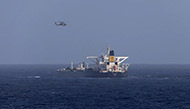MARJA, Afghanistan - They expected tea, not firefights. But the three female Marines and their patrol were shot at late on a recent day, when a burst of Kalashnikov rifle fire came from a nearby compound.
The group jumped to the ground, crawled into a ditch and aimed its guns across the fields of cotton and corn. In their sights they could see the source of the blast: an Afghan man who had shot aimlessly from behind a mud wall, shielded by a half-dozen children.
They held their fire so as not to hit a child, waited for the all-clear, then headed back to the base, survivors of yet another encounter with the enemy. “You still get that same feeling, like, ‘Oh, my gosh, I’m getting shot at,’ ” said Lance Corporal Stephanie Robertson, 20, speaking of the firefights that have become part of her life in Marja.
“But you know what to do. You’re not, like, comfortable, because you’re just . . . ” She stopped, searching for how to describe her response to experiences that for many would be terrifying. “It’s like muscle memory.” Six months ago, Lance Corporal Robertson arrived in Afghanistan with 39 other female Marines from Camp Pendleton, California, as part of an unusual experiment of the American military: sending full-time “female engagement teams” out with all-male infantry patrols in Helmand Province to try to win over the rural Afghan women who are culturally off limits to outside men.
The female Marines, who volunteered , were to meet with Pashtun women over tea in their homes, assess their need for aid, gather intelligence, and help open schools and clinics. They have done that and more, and as their seven-month deployment in southern Afghanistan nears an end their “tea as a weapon” mission has been judged a success.
But the Marines, who have been closer to combat than most other women in the war, have also had to use real weapons in a real fight tougher than many expected. Here in Marja - which, seven months after a major offensive against the Taliban, is improving but remains one of the most dangerous places in Afghanistan ? the female Marines have daily skirted the Pentagon rules restricting women in combat.
They were sidelined in July for three weeks midway through their tour while their rules of engagement were clarified. They have shot back in firefights and ambushes, been hit by homemade bombs and come under mortar attack. None of the 40 women have been seriously injured. But some have seen good friends die. One of the women, Corporal Anica Coate, 22, was on patrol in early September in southern Marja 1.5 meters behind Lance Corporal Ross S. Carver, 21, when he was killed by an insurgent sniper. A week later, at a memorial service in Marja , she said she would not volunteer again.
“It’s not the living conditions, it’s not the mission, it’s this,” she said, gesturing toward a memorial display of boots, rifles and dog tags belonging to the dead Marines. She was, she said quietly, “too much of a girl to deal with these guys getting killed.” For Captain Emily Naslund, 27, the women’s commander, the sacrifices and the frustrations have been worth it. “This is going to be the highlight of my life,” she said. But to Captain Naslund, the military’s stance on women in combat is absurd when there are no front lines ? and when members of her team are taking fire almost daily on foot patrols. “The current policy on women in combat is outdated and does not apply to the type of war we are fighting,”
she wrote to her parents, friends and a reporter in an e-mail after the legal review in July. Since then, she has grudgingly accepted that the Marine Corps is a long way from allowing women in the infantry, and that she will live within the guidelines. With their tour soon ending, the replacements for the female Marines arrived in late September in Helmand, 45 young women from Camp Pendleton. The old team introduced the new team to the Pashtun women with whom they have built relationships, with the hope the contact continues.
“Just making a small improvement in somebody’s life, that means something,” Captain Naslund said. “And if that means that someday women don’t have to wear a burqa, great. If it means that they’re getting beat up and they’ve got some place to go to tell somebody, great.” In the end, she said, “They’re going to remember what we did.”
스마터리빙
more [ 건강]
[ 건강]이제 혈관 건강도 챙기자!
[현대해운]우리 눈에 보이지 않기 때문에 혈관 건강을 챙기는 것은 결코 쉽지 않은데요. 여러분은 혈관 건강을 유지하기 위해 어떤 노력을 하시나요?
 [ 건강]
[ 건강]내 몸이 건강해지는 과일궁합
 [ 라이프]
[ 라이프]벌레야 물럿거라! 천연 해충제 만들기
 [ 건강]
[ 건강]혈압 낮추는데 좋은 식품
[현대해운]혈관 건강은 주로 노화가 진행되면서 지켜야 할 문제라고 인식되어 왔습니다. 최근 생활 패턴과 식생활의 변화로 혈관의 노화 진행이 빨라지고
사람·사람들
more많이 본 기사
- 폭설 속 산행 비극… 마운트 볼디서 3명 조난 사망
- “10년간 모든 이민 전면 금지?” 황당 주장
- LA 북쪽 테혼 카지노서 하룻새 10만불 ‘연속 잭팟’
- 안성기, 1월 1일 생일 하루 앞두고 심정지 상태 병원 이송..쏟아지는 응원
- ‘故장제원 아들’ 노엘 “구치소서 58kg→95kg” 모습 보니
- 가주 판매 간 소고기 ‘이콜라이’ 오염
- [알림] 오늘 신년특집 발행, 연방 공휴일인 새해 1월1일자 신문은 발행되지 않습니다.
- [연말 기획] 한국계 혼혈들 두각… 각 분야에서 ‘맹활약’
- 지방세 공제한도 1만→4만달러로 상향
- ‘아듀~ 2025!’… 희망찬 새해로
- 신년 연휴 폭풍우… 비 3인치 온다
- 한국팀 뛸 곳인데… 강력범죄 ‘충격’
- 전남대 신년회
- 불체자 의심 메디케이드 정보 공유 허용
- 22개주서 생굴 먹고 살모넬라균 감염
- NYPD 무력 사용 역대급 증가
- 원·달러 환율… 연평균 기준 ‘역대최고’ 마감
- ‘백두산 호랑이’ 대가족 포착… “매우 희귀한 일”
- 이명석 회장, “공금횡령^불법행위 한적 없다“
- 알고보니 ‘완전식품’인 고구마의 놀라운 효능
- ‘헤비급 복서’ 조슈아 구사일생 동승자 2명 사망사고에도 경상
- 한인 음악인들 ´희망의 선율´ 병오년 새해 밝힌다
- “라면, 못 끊겠다면 ‘이거’라도 넣어라”
- 브라이언트팍서 외국인 관광객 묻지마 칼부림
- 장수성인데이케어, 송년 파티
- ‘케네디’가 또 비극 외손녀 희귀암 별세
- 멕시코, 한국 포함 FTA미체결국에 최대 50% 관세
- 구리선 절도범 소행에 LA 교통 통신망 ‘먹통’
- 문소리, 아이유 이어 강하늘 엄마 된다..영화 ‘국제시장2’ 합류
- 뉴욕한인변호사협, 무료 전화 법률상담
- 그레잇넥교회, 더나눔하우스에 후원금
- [연말 화제] 올해도 찾아온 ‘얼굴 없는 천사’
- “치매에 치즈가 좋대서 맨날 먹었는데”… 고지방 주의
- 트럼프 “베네수엘라 마약 싣는 항만 타격”… 첫 지상 공격
- 트럼프 이름 덧붙인 ‘케네디센터’ 공연 줄취소
- “미군에 쫓기는 ‘유령선단’ 유조선, ‘러시아 국적’ 주장”
- 샴페인, 마지막 날과 첫날을 위하여
- 내년 1월부터 달라지는 MD 법안들
- 위너 송민호, 병역법 위반 혐의 불구속 기소
- [한인 은행장 신년사 통해 본 비전과 경영 목표] “끊임없는 변화와 혁신으로 안정적 성장 도모”
- 케이스쉴러 주택가격지수 상승
- [조지 F. 윌 칼럼] 저무는 2025년에 안도의 한숨
- 한동훈 “가족이 尹부부 비판 글 올린… 2
- 사실상 고객 1인당 1만원… “생색내기 보상으로 불신만 키워”
- 트럼프 만나고온 젤렌스키 “우크라에 미군 주둔 방안 논의중”
- 단백질 늘리고 탄수화물 줄이고…영양소 적정 기준 개정
- 2025 워싱턴지역 10대 뉴스
- 임영웅, 2025년에도 빛난 ‘히어로’..음악·예능·공연 모두 잡았다
- [경제 트렌드] AI 열풍 속에 신흥 2030 억만장자 급증
- 토트넘 열광 “양민혁 극적 반전, 귀중한 결승골 터뜨렸다”... “믿기지 않는다” 英 현지도 극찬
1/5지식톡

-
 미 육군 사관학교 West Poin…
0
미 육군 사관학교 West Poin…
0https://youtu.be/SxD8cEhNV6Q연락처:wpkapca@gmail.comJohn Choi: 714-716-6414West Point 합격증을 받으셨나요?미 육군사관학교 West Point 학부모 모…
-
 ☝️해외에서도 가능한 한국어 선생님…
0
☝️해외에서도 가능한 한국어 선생님…
0이 영상 하나면 충분합니다!♥️상담신청문의♥️☝️ 문의 폭주로 '선착순 상담'만 진행합니다.☎️ : 02-6213-9094✨카카오톡ID : @GOODEDU77 (@골뱅이 꼭 붙여주셔야합니다…
-
 테슬라 자동차 시트커버 장착
0
테슬라 자동차 시트커버 장착
0테슬라 시트커버, 사놓고 아직 못 씌우셨죠?장착이 생각보다 쉽지 않습니다.20년 경력 전문가에게 맡기세요 — 깔끔하고 딱 맞게 장착해드립니다!장착비용:앞좌석: $40뒷좌석: $60앞·뒷좌석 …
-
 식당용 부탄가스
0
식당용 부탄가스
0식당용 부탄가스 홀세일 합니다 로스앤젤레스 다운타운 픽업 가능 안녕 하세요?강아지 & 고양이 모든 애완동물 / 반려동물 식품 & 모든 애완동물/반려동물 관련 제품들 전문적으로 홀세일/취급하는 회사 입니다 100% …
-
 ACSL 국제 컴퓨터 과학 대회, …
0
ACSL 국제 컴퓨터 과학 대회, …
0웹사이트 : www.eduspot.co.kr 카카오톡 상담하기 : https://pf.kakao.com/_BEQWxb블로그 : https://blog.naver.com/eduspotmain안녕하세요, 에듀스팟입니다…
케이타운 1번가
오피니언
 정숙희 논설위원
정숙희 논설위원샴페인, 마지막 날과 첫날을 위하여
 조지 F·윌 워싱턴포스트 칼럼니스트
조지 F·윌 워싱턴포스트 칼럼니스트 [조지 F. 윌 칼럼] 저무는 2025년에 안도의 한숨
 김동찬 시민참여센터 대표
김동찬 시민참여센터 대표 [미국은 지금] 책임 있는 자본 없으면 커뮤니티 미래도 없다
 성영라 수필가 미주문협 부이사장
성영라 수필가 미주문협 부이사장 [수요 에세이] 다시, 제자리로 돌아와서
 신경립 / 서울경제 논설위원
신경립 / 서울경제 논설위원 [만화경] 경영자의 ‘문제적’ 사과
 문태기 OC지국장
문태기 OC지국장 한인 정치력 업그레이드 기대
 민경훈 논설위원
민경훈 논설위원세계 역사를 바꾼 동물
 박홍용 경제부 차장
박홍용 경제부 차장 한인사회가 주목해야 할 새해 경제
 박영실 시인·수필가
박영실 시인·수필가 [화요칼럼] 피드백
1/3지사별 뉴스

지방세 공제한도 1만→4만달러로 상향
2026년 새해에도 뉴욕과 뉴저지 한인들의 일상에 크고 작은 영향을 미치는 다양한 규정과 법규가 새롭게 바뀌게 된다. 당장 1일부터 뉴욕시 최…
■ 사고- 한동대·뉴욕한인청소년센터 국제여름캠프

2025 워싱턴지역 10대 뉴스
다사다난했던 2025년이 하루만 남겨둔 채 역사의 저편으로 저물고 있다. 올해의 가장 큰 뉴스는 트럼프 2기 행정부 출범과 함께 몰아친 이민 …
내년 1월부터 달라지는 MD 법안들

셀폰 위치추적, 납치된 딸 살렸다… ‘부모 통제’ 기능 활용
스마트폰에서 자녀의 위치를 확인할 수 있는 ‘부모 통제(parent control)’ 위치 추적 기능의 도움으로 납치됐던 청소년들이 잇달아 구…
[새해부터 이렇게 달라진다] 최저임금 또 오르고… 유급 병가는 더 확대

오늘 하루 이 창 열지 않음 닫기 





















































.png)


댓글 안에 당신의 성숙함도 담아 주세요.
'오늘의 한마디'는 기사에 대하여 자신의 생각을 말하고 남의 생각을 들으며 서로 다양한 의견을 나누는 공간입니다. 그러나 간혹 불건전한 내용을 올리시는 분들이 계셔서 건전한 인터넷문화 정착을 위해 아래와 같은 운영원칙을 적용합니다.
자체 모니터링을 통해 아래에 해당하는 내용이 포함된 댓글이 발견되면 예고없이 삭제 조치를 하겠습니다.
불건전한 댓글을 올리거나, 이름에 비속어 및 상대방의 불쾌감을 주는 단어를 사용, 유명인 또는 특정 일반인을 사칭하는 경우 이용에 대한 차단 제재를 받을 수 있습니다. 차단될 경우, 일주일간 댓글을 달수 없게 됩니다.
명예훼손, 개인정보 유출, 욕설 등 법률에 위반되는 댓글은 관계 법령에 의거 민형사상 처벌을 받을 수 있으니 이용에 주의를 부탁드립니다.
Close
x